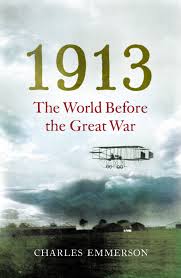China 1913 – Getting in Early on WW1 Fever
Posted: August 18th, 2013 | No Comments »Without doubt you will not be able to forget next year that its the centenary of the start of the First World War – books, TV and God only knows what will remind you, you can bet on that. Traditionally, in amongst all those images of the trenches and battlefields of France and Belgium, China has been a rather forgotten element in the conflict. However, of course China was technically an allied power, sent the Chinese Labour Corps to Europe (or at least allowed them to be recruited by Britain and France), had problems of its own with Japan and ultimately refused to sign the Versailles peace treaty in 1919. There will be a lot on all that next year – hopefully I’ll be able to reveal some exciting plans around work on China and the Great War soon. However, before that worth noting that Charles Emmerson has got in early on the WW1 bandwagon with his book 1913 – The World Before the Great War.
1913 is essentially an overview of the world on the eve of war and does include a pretty useful chapter on the situation in Peking and Shanghai. I’m reviewing elsewhere so just the book jacket and blurb here but excellent that China is included. With a few notable exceptions there’s been a dearth of scholarship on China and the First World War though hopefully the centenary of the war will change that….
1913: The World before the Great War proposes a strikingly different portrait, returning the world in that year to its contemporary freshness, its future still undecided, its outlook still open. Told through the stories of twenty-three cities – Europe’s capitals at the height of their global reach, the emerging metropolises of America, the imperial cities of Asia and Africa, the boomtowns of Australia and the Americas – Charles Emmerson presents a panoramic view of a world crackling with possibilities, from St Petersburg to Shanghai and from Los Angeles to Jerusalem. What emerges is a rich and complex world, more familiar than we expect, connected as never before, on the threshold of events which would change the course of global history.
Forever in the shadow of the war which followed, 1913 is usually seen as little more than the antechamber to apocalypse. Our perspectives narrowed by hindsight, the world of that year is reduced to its most frivolous features – last summers in grand aristocratic residences, a flurry of extravagant social engagements – or its most destructive ones: the unresolved rivalries of the great European powers, the anxieties of a period of accelerated change, the social fear of revolution, the violence in the Balkans. Our images of the times are too often dominated by the faded pastels of upper-class indulgence or by the unmitigated blackness of a world rushing headlong into the abyss of an inevitable war.
Most retrospective accounts of the world in 1913 reduce it to either its most frivolous features – last bright summers in grand aristocratic residences – or to its most destructive ones: the rivalries of great European powers, rumbling social unrest in Russia and the angst of Viennese coffee houses. The portraits that result are dominated either by the faded pastels of aristocratic indulgence or the undifferentiated blackness of a world on the brink of the abyss. The true nature of the times – optimistic, modern and internationalist, as much as pessimistic, archaic and nationalist – is lost.
1913: The World before the Great War proposes a different and more expansive portrait of 1913, returning this world to its contemporary freshness. It brings key elements – the way it was ordered, its presumptions, its expectations for the future – back to life. It paints a coherent picture without skimming over differences, or ignoring contradictions. What emerges is unexpected: more richly patterned, more diverse and more outwardly secure. Through the stories of cities from Detroit to Bombay, Winnipeg to Durban, Tokyo to Algiers, Charles Emmerson reveals a year in which a truly global society was emerging for the first time in human history
CHARLES EMMERSON was born in Australia and grew up in London. After graduating top of his class in Modern History from Oxford University he took up an Entente Cordiale scholarship to study international relations and international public law in Paris. The author of The Future History of the Arctic (2010), he has also written numerous articles for a variety of newspapers, as well as speaking widely on geopolitics to university, literary, government and business audiences.He is a Senior Research Fellow at Chatham House (the Royal Institute for International Affairs).

Leave a Reply